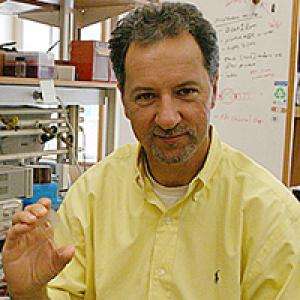Research leads to portable DNA testing device

(Phys.org) —More than 10 years of research and development have led to the introduction of a portable DNA analysis device that relies on technology developed by University of Virginia professor James P. Landers and a team of University researchers in collaboration with Lockheed Martin.
Low-volume production of the new IntrepID S2A-90 device is under way, and full-scale production is being ramped up as Lockheed Martin delivered the device to select customers in May.
The collaborative effort to develop a new way to rapidly identify human DNA without a complex series of manual lab processes traces back to technology developed by Landers, a professor of chemistry in U.Va.'s College of Arts & Sciences, and graduate students in the departments of chemistry in the College, and Mechanical Engineering and Electrical Engineering in the School of Engineering and Applied Science
That "lab-on-a-chip" technology, which aims to miniaturize and streamline the chemical processes involved in DNA testing and other biochemical analyses, led to the founding in 2003 of a U.Va. start-up company, MicroLab Diagnostics. Essentially, its goal was to build an entire lab on a single chip reliant on microfluidic technology.
Landers and a team of researchers with University ties, including chemists and mechanical and electrical engineers, worked on designing a device that could serve as a full-service lab, in miniature.
"The whole concept is that if you shrink down the plumbing, you can do very, very fast biochemistry," Landers said. "And the really rewarding part about this device is that it's in many ways a home-grown U.Va. success because of the number of U.Va. people involved from the College of Arts & Sciences, the School of Engineering and the School of Medicine."
The DNA testing process with the IntrepID S2A-90 begins with the collection of a biological sample, such as a cheek swab. Once the sample has been collected, it is attached to a hand-held cartridge that can hold as many as four swabs for analysis.
Using a proprietary enzymatic process, the DNA is released from the swab and presented for analysis, and with a combination of laser optics and detectors, the targeted DNA is identified, producing a profile ready for analysis on site.
In a statement released by Lockheed Martin, Business Development manager Bret Light said the new IntrepID S2A-90 device provides rapid DNA analysis, in the lab and in the field, in less than 90 minutes. Under previous tests, results took days, if not weeks to process.
"We're excited about the capabilities it can offer for forensic laboratories, law enforcement and other prospective users to perform DNA testing quickly and securely and meet their mission needs," Light said.
With a change in the on-board chemistry, the device also has the potential to be used in doctors' offices, for example, to quickly test for a variety of infectious diseases, as well as for cancer or genetic defects. The quick turnaround time for test results means a much quicker diagnosis for patients.
For forensic labs and law-enforcement officials, the use of a portable DNA testing device that promises results in a matter of minutes and not days could alleviate the ever-increasing backlog of lab tests. It also could lead to a much quicker identification of criminal suspects by matching DNA evidence at crime scenes against a database of known offenders.
R. Paul Gray, the managing member of MicroLab Horizon, which acquired the technology developed by the U.Va. start-up, said the impact of the device will be "paradigm-shifting."
"The technology is superior to anything in the marketplace presently," Gray said. "It's been a great cooperative relationship between the University, Dr. Landers and Lockheed Martin to get the product where it is."
Provided by University of Virginia





















